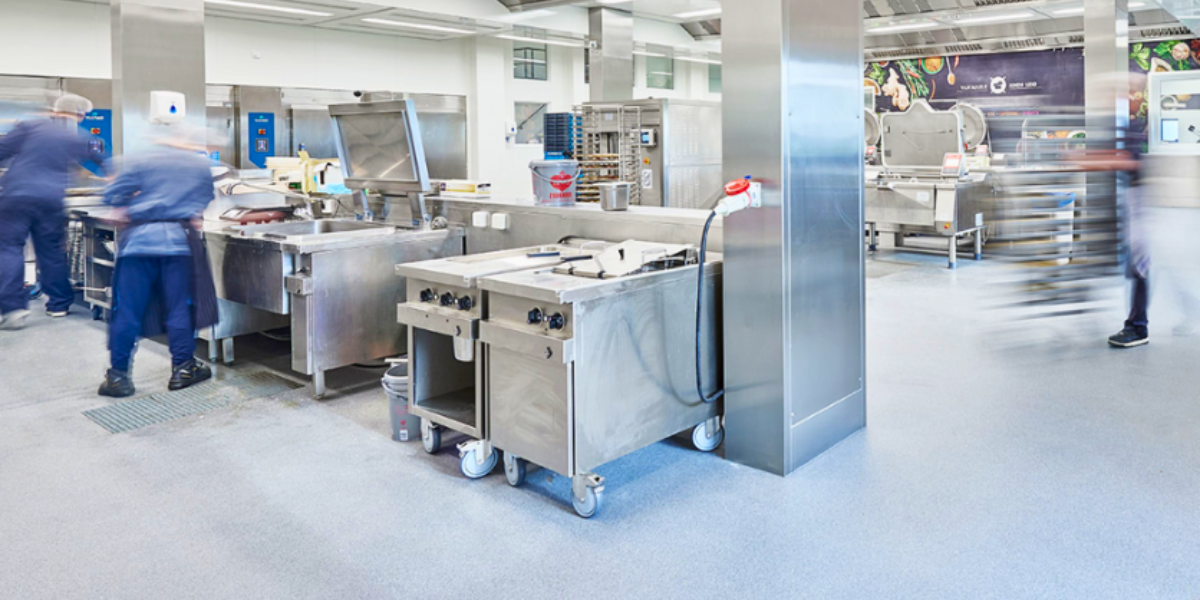Table of Contents:
Table of Contents:
Contributors: Tamer Abdel-Aal, Technical Support Engineer - Stonhard Canada and Christopher Trageser, Product Manager - Tech Service, Stonhard
Slips and trips are a common hazard that can lead to serious injuries, with approximately 67% of falls on walking surfaces caused by factors like wet or oily floors, excessive tile glazing, weather-related conditions, and varying levels of traction.[1] These dangers highlight the critical need for proactive safety measures in both public and private spaces. This is precisely why slip tests exist – to evaluate the slip resistance of surfaces, identify potential risks, and ensure safer walking environments for everyone.
The DCOF Rating Slip Test
The DCOF, (or dynamic coefficient of friction), is a measurement that determines how much friction is on wet, level floors when walked upon and whether the flooring surface could contribute to someone slipping and/or falling. Reliable flooring manufacturers and installers will have tested their products and make this data available to you, so that you can be certain the floor will meet the standards for the specific space in your facility. In addition to test results, the floor’s use, traffic, expected contaminants, maintenance, and wear should be considered, as well as additional guidelines and recommendations from the floor manufacturer.
How is the Slip Test Conducted?
There are several types of testers that may be used to determine DCOF. A pendulum tester is the most accepted one used throughout the world. It has a standardized rubber on the bottom of a pendulum foot and is set up to travel on the flooring surface for 125 mm. The arm swings from a fixed position, makes contact with the floor, and then swings back up where it provides a reading. The reading is known as the pendulum test value which is equivalent to DCOF. The minimum acceptable value is 0.36. Other popular slip-resistant testers are the variable incidence tribometer (VIT) and BOT 3000E.
What About the SCOF Rating Slip Test?
You may hear about another test method called SCOF (static coefficient of friction). SCOF measures slip resistance at a standstill, while DCOF measures slip resistance in motion. DCOF is considered a more accurate test for slip resistance. Since slips occur most frequently during the heel strike stage of a gait cycle, with the heel sliding forward relative to the rest of the body, your floor installer should be using the DCOF method to obtain the best results for your facility.

Slip-resistant, seamless flooring in classrooms provides a secure and durable surface, ensuring a safe environment for students and staff.

In a busy commercial kitchen, slip-resistant resinous flooring enhances safety, reducing the risk of slips and falls in high-traffic, spill-prone areas.
Adding Texture to Resinous Floors for Slip Resistance
Seamless, poured-in-place floors are easy to clean, durable, and can be formulated to solve several issues commercial and industrial facilities are exposed to during their operations. Slip resistance can be configured based on the type and level of texture needed as determined by testing and other factors mentioned above. An experienced flooring expert will be able to advise you based on test results, knowledge of similar facilities and knowledge of the flooring product and also be able to discuss the balance between slip resistance and cleanability since both slip resistance and sanitary conditions affect safety.
How Does Stonhard Test for Slip Resistance?
Stonhard uses the BOT-3000E in accordance with ANSI A326.3 to measure DCOF. This standard was developed for the tile industry, and while hand-applied resinous flooring will always have some limits in consistency when compared to manufactured goods, we can use this device on samples and floors in place to gain a level of confidence with the slip resistance that can be delivered.
Custom textured samples can be tested at time of production. The option is also available for on-site testing if requested.
The English XL VIT is also available for in-house testing, though the DCOF standards are currently the preferred methods of testing.
About Stonhard
Stonhard is the unprecedented world leader in manufacturing and installing high-performance polymer floor, wall and lining systems. Stonhard maintains 300 territory managers and 200 application teams worldwide who will work with you on design specification, project management, final walk-through and service after the sale. Stonhard’s single-source warranty covers both products and installation. Contact us to learn more about our precision installation methods and specialized products.
Related Articles
Loving this Content?
Subscribe to upcoming topics!











